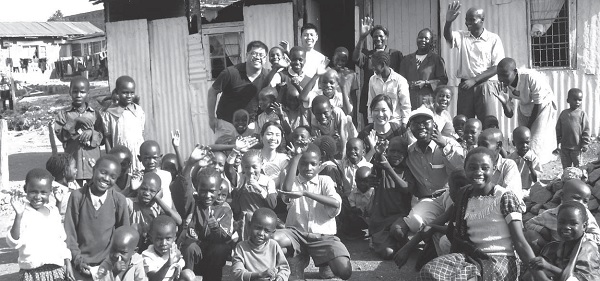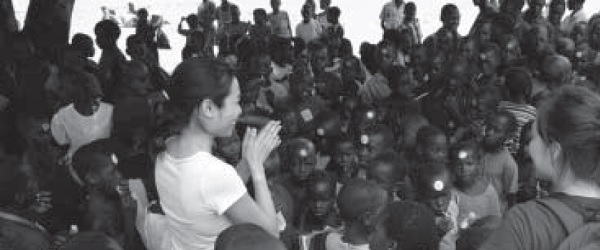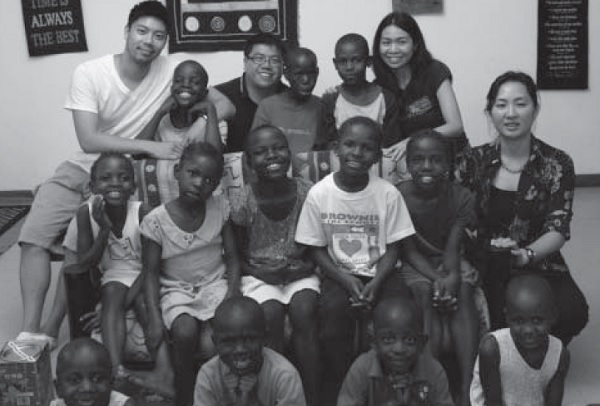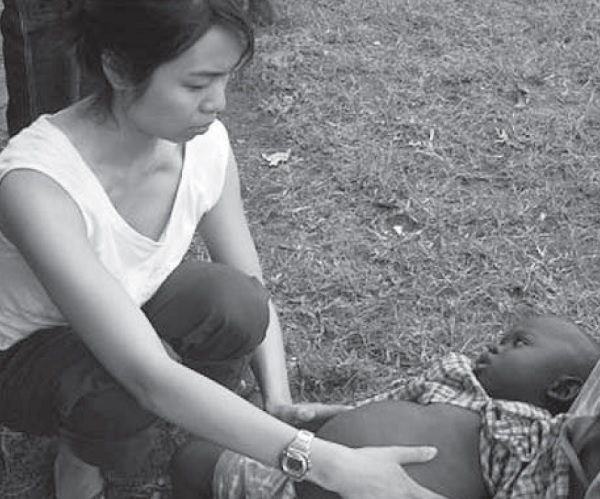Bring love to Africa
AIDS orphans in tin boxes
Interview/Liao Meihui

▲It was a shabby classroom about 10×20 square feet made of iron sheets. There was no electricity, no blackboard, and no table. It was filled with more than fifty students and several teachers.
"More than fifty children swarmed in, hugged me tightly, and said, 'You really kept your promise and came back to see us!' I couldn't help but shed tears..." Ruoge Church English Church in New Jersey Sister Anita Liu recalled that in March this year, she went to Kenya and Uganda in Africa for the third consecutive year to visit orphan schools supported by different organizations.
Kenya’s Tin Box School
On the third short-term mission to Africa, Liao Xuexin’s brother Liao Hongzhang (Daniel) and two members of the Ruoge English Church were also accompanied. The four young people brought twelve large suitcases. In addition to one box of personal belongings, the luggage was filled with medical supplies, vitamins, stationery supplies, toothbrushes, books... and a lot of love.
After flying for 17 hours, we finally arrived in Nairobi, the capital of Kenya. With the help of a local Chinese pastor Lai, Liao Xuexin and her group came to the "Anchor of Hope AIDS Orphans and Widows Center", an orphan school less than half an hour's drive from the urban slums. established schools.
Rather than saying this is a school, it would be more accurate to say it is a broken iron box. It was a shabby room made of iron sheets about 10×20 square feet, filled with more than fifty students and several teachers. There is no electricity, blackboard, table, pen, paper... let alone air conditioning or electric fan.
Walking into the "classroom," the temperature was about 90 degrees Fahrenheit. The children sat on the dirt-covered ground, with their eyes open in unusually clear black and white, and listened intently to the teacher's lecture. This iron box, which is worse than an illegal building, is the "school" where they walk for half an hour every day from the nearby slums to attend classes.
This group of innocent children felt very fresh about the four young people, showing curious eyes and reaching out to touch their straight black hair from time to time.
"We know that your president is Obama. What kind of place is the United States? I really hope to go and see it one day!" Liao Xuexin said that in Kenya, almost everyone is an "Obama fan." For these children, the United States is an unattainable dream country.
"Several children sat on my lap, clung to me, and stared at me; some even sang to me!" Liao Hongzhang opened his hands to each child, knowing that what these children need most is love!
The more than fifty orphans come from broken families. AIDS has taken away their relatives. Some live in single-parent families, some have lost both parents and are raised by grandparents, and even older children are raising younger children.

▲A residential school in Uganda run by Pastor Butch's Ministries accommodates 800 students. Since the children have to attend school for twelve years, it has become a good place for evangelism, and 50 people are baptized every year.
Children in the shadow of AIDS
Kenya’s population under the age of 18 accounts for 50% of the country. Not only in Kenya, AIDS has now caused a gap in the prime of life in some African countries, leaving the elderly and young orphans behind. The countryside has become dead cities, and the entire society and economy are on the verge of collapse.
Children in many African countries have been left without guardians again and again. They first became orphans because their parents died of AIDS and were cared for by their uncle and aunt. Then their uncle and aunt died of AIDS, making them orphans again. Many children are forced to live on the streets, into crime, or into prostitution.
The epidemic of the century, AIDS, has brought unprecedented suffering to children. Some of them were forced to give up their studies and look after sick relatives or siblings at home. Millions of orphans have lost the love and care of their parents, and the saddest thing is that they are often abused, abandoned and exploited by their relatives. The stigma they endure due to AIDS is more severe than the physical harm.
When she went to Africa for the first time, Xue Xin asked the same question that many people asked: "God, are you really here? Why do you let so many innocent children suffer? Why did you bring them into this world, but you didn't?" And let them be abandoned and become orphans? Why are there so many suffering children on the verge of death? Why...?
This eternal problem is not something that the young and sentimental Xue Xin can immediately find the answer to. But she firmly believed that God was in control and that God’s thoughts were higher than human thoughts. God loves everyone He created, including African orphans. She was willing to come back a second or third time to let her children feel God’s love and mercy.
"In the United States, no one would be curious about a pencil; but here, they cherish a pencil as a treasure, and they are reluctant to throw it away even when they can no longer hold it in their hands!"
Liao Xuexin brought the leftover stationery from the church’s summer Bible school (VBS) to Africa. In the United States, children are given a whole box of crayons. Here, giving a used crayon will make them excited for several days!
Children here, everyone likes to go to school because there is nothing to eat at home. Come to school, and if you are lucky enough to have someone sponsor you, you may even get a free lunch.
In tin-house schools, children only have one meal a day, and sometimes, they even have nothing to eat all day long. The current challenge is to find food sponsors in the short term, and in the long term hope to find enough funds to train local people and help rebuild the school.

▲Four members of the short-term mission team of Ruoge Church took a group photo with the children from the "Love One by One" orphan home (the person on the far right in the third row is Xue Xin, and the third from the left is Hong Zhang).
Inspired by Two Thousand Bibles
Uganda’s needs and challenges are broadly similar to Kenya’s. Poverty, disease, AIDS, orphans, and the civil war in the north make the political situation even more unstable than in Kenya.
During Liao Xuexin's three trips to Uganda, she was deeply moved when the short-term mission team asked a local organization in the north what items they needed most, and their answer turned out to be the Bible. Xue Xin returned to the United States and raised 8,000 yuan to buy 2,000 Bibles and give them to their prison inmates and orphan village.
"They could have asked for medicine, food or money, but they didn't. They only asked for a Bible. This really surprised and touched me!"
"When I walked into a church in Africa and saw them worshiping and praising me, I couldn't help but admit that God must be here! Their enthusiasm for God taught me what worship is!"
The first two times, Liao Xuexin participated in the short-term mission team of the Loving One by One Ministries Christian organization headquartered in California. The organization established a home for orphans in Uganda three years ago and currently houses twelve children. "Chris, Charles, Henry, Lawrence, Mercy, Erin..." Liao Xuexin can accurately call each child's name. There is a school attached to the orphanage, where the children share household chores, follow daily schedules, and attend Bible classes first every day. The goal of the organization is to train these orphans to serve more local orphans when they grow up.
Xue Xin once asked her children: "What are you most afraid of?" "One day, this family will no longer want us, and we will go back to our old life." The answer was simple, but heartbreaking.
In Uganda, Liao Xuexin met a two-year-old boy by chance. His mother died of AIDS and his father suddenly disappeared. A kind-hearted old lady took the little boy home. When she learned that the missionary agency was coming to the village, the old lady brought him for a physical examination. "It was the first time I saw a child with such a big belly. I was really shocked! Fortunately, it was just a parasite infection and it was not life-threatening."
The old lady was willing to take care of a stranger's child despite not having enough to eat. Liao Xuexin was so moved that she took out all the change she had and gave it to the old lady, asking her to buy some nutritional supplements for the little boy to eat.
The "One to One Love" organization originally wanted to take in the little boy. Suddenly, the child's father appeared and insisted that the organization pay a sum of money before he was willing to hand over custody. "This is really sad. It is conceivable that an irresponsible father will eventually abandon this child. But we still have to abide by legal procedures and cannot take the child back to the orphanage without the consent of the guardian!"
Africans called white missionaries "Mzungu". A woman in northern Uganda heard the Mzungu coming and ran seven miles to catch up with their car. There are thirty-five families in this village, and each family has at least one AIDS orphan. The woman begged the One to One Love organization to help the children. Finally, the organization came up with a special plan for these 35 families, purchasing a sheep or pig for each family. Each household earns income from selling goat milk or pork to buy food. The organization also stipulates that after lambs and piglets are born in the future, they must be transferred to other people in need.

▲The first time I saw a child with such a big belly, Liao Xuexin was really shocked! Fortunately, the child was only infected with parasites and his life was not in danger.
Shocking slums
Liao Hongzhang, who was on a short-term mission in Africa for the first time, said that the most unforgettable scene for him was walking into Kibera, a slum near Nairobi, the capital of Kenya. It is the second largest slum in the world after Mumbai, India. ghetto.
"I almost couldn't believe my eyes. The rotten smell that filled the air made it hard for me to breathe. In these four square kilometers, nearly 1.7 million people live. Groups of children walk on the streets every day without a care in the world. Purpose, wandering around, a five-year-old child taking care of a one-year-old baby, and a bunch of children looking for food in the garbage... There is no running water, no sewers, and all the slums are located in the urban area of the capital. It is only one street away from the better residential areas, and there is a huge difference. The homeless people on the streets in the United States are a thousand or ten thousand times better off than the residents here..."
"If you see the overall situation in Africa, you may be immediately intimidated and think that you can't do anything." After returning from Africa, 23-year-old Hongzhang still kept in mind, "If everyone is willing to do more, If you give a little bit, the world will become a better place. I want to apply the engineering skills I have learned to poor areas in Africa, maybe to build a simple water purification project or build a toilet. I think everyone can. Try your best to do what you can, and the world will change step by step!"
The orphans in the tin boxes are just a small microcosm of the tens of millions of orphans in Africa. In Africa, AIDS has orphaned 15 million children, more than half the population of Taiwan and more than the entire population of New York City. 10% of the world's population lives in Africa, but 90% of the world's AIDS orphans actually grew up in Africa. The United Nations warns that by 2010, there may be as many as 18 million children on the African continent who have lost their parents to AIDS.
Can the Chinese church really be indifferent to the innocent lives pointed out by this huge number? Can you really say what do African orphans have to do with me? Can we ignore the suffering of tens of millions of people? Pray to God to help us, give us a willing heart, and say to Him: “Yes!” Courageously bring love to Africa.
(Thanks to Liao Xuexin for providing the pictures for this article)
